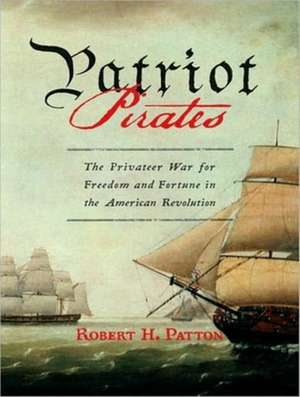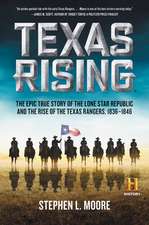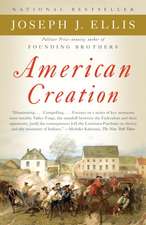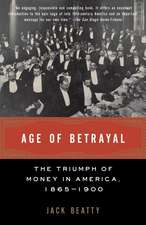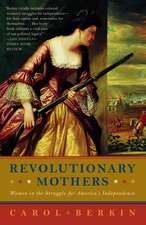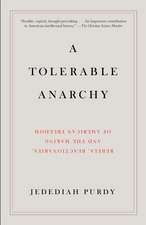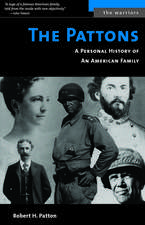Patriot Pirates: The Privateer War for Freedom and Fortune in the American Revolution
Autor Robert H. Patton Alan Sklaren Limba Engleză CD-Audio – 31 mai 2008
They were legalized pirates empowered by the Continental Congress to raid and plunder, at their own considerable risk, as much enemy trade as they could successfully haul back to America's shores. They played a decisive role in America's struggle for independence and later turned their seafaring talents to the slave trade, revealing the conflict between enterprise and morality central to American history.In Patriot Pirates, Robert H. Patton, the grandson of the battlefield genius of World War II, writes how privateering engaged all levels of Revolutionary life, from the dockyards to the assembly halls; how it gave rise to wild speculation in purchased shares in privateer ventures, enabling sailors to make more money in a month than they might earn in a year; and how privateering created fortunes that survive to this day.As one naval historian wrote, "The great battles of the American Revolution were fought on land, but independence was won at sea."Patton writes how, in addition to its strategic and economic importance, privateering played a large political role in the Revolution. For example, Benjamin Franklin, from his diplomatic post in Paris, secretly encouraged skippers to sell their captured goods in French ports—a calculated effort on Franklin's part to break the neutrality agreements between France and Britain, bring the two countries to blows, and take the pressure off American fighters. This is a sweeping tale of maritime rebel-entrepreneurs bent on personal profit and national freedom.
Preț: 122.86 lei
Nou
Puncte Express: 184
Preț estimativ în valută:
23.51€ • 24.61$ • 19.57£
23.51€ • 24.61$ • 19.57£
Indisponibil temporar
Doresc să fiu notificat când acest titlu va fi disponibil:
Se trimite...
Preluare comenzi: 021 569.72.76
Specificații
ISBN-13: 9781400156603
ISBN-10: 1400156602
Dimensiuni: 136 x 191 x 14 mm
Greutate: 0.1 kg
Ediția:Completă
Editura: TANTOR MEDIA INC
ISBN-10: 1400156602
Dimensiuni: 136 x 191 x 14 mm
Greutate: 0.1 kg
Ediția:Completă
Editura: TANTOR MEDIA INC
Recenzii
"Alan Sklar narrates with spirit and enthusiasm, bringing alive both the historic conflicts and the political atmosphere of the Revolution." ---AudioFile
Notă biografică
Robert H. Patton, the grandson of General George S. Patton, is a novelist living in Darien, Connecticut. His books include The Pattons: A Personal History of an American Family, Up, Down and Sideways, and Life Between Wars. Winner of several AudioFile Earphones Awards and a multiple finalist for the APA's prestigious Audie Award, Alan Sklar has narrated nearly two hundred audiobooks, including Black Hawk Down by Mark Bowden, The Kennedys: America's Emerald Kings by Thomas Maier, and The Looming Tower by Lawrence Wright. Named a Best Voice of 2009 by AudioFile magazine, his work has earned him a Booklist Editors' Choice Award (twice), a Publishers Weekly Listen-Up Award, and Audiobook of the Year by ForeWord magazine. The Dartmouth graduate's theatre credits include Hamlet, The Taming of the Shrew, The Seagull, and many modern roles. Alan has also narrated thousands of corporate videos for clients such as NASA,Sikorsky Aircraft, IBM, Dannon, Pfizer, AT&T, and SONY. For several years, he has been the spokesman for TracFone Wireless Co. and can often be seen and heard on TracFone radio and TV spots and infomercials."I am so pleased, as is my husband, to have found a narrator that holds our attention so well that we have come to compare every other narrator to him (you). So far we have found none with such a talent as yours. We very much plan to listen to as many of your works as we can find." -Sandi King, a letter to Mr. Sklar
Descriere
A revelation of America's War of Independence, "Patriot Pirates" explores an overlooked aspect of the war--that of its citizen privateers, legalized sea rovers who by the thousands raided British trade ships throughout the Atlantic and who were decisive in cracking Britain's wartime resolve. Unabridged. 1 MP3 CD.
Extras
PROLOGUE
Beset by a sudden squall in April 1775, a small British sloop, “very much torn to pieces by the gale of wind,” ducked into the sheltered bay off Beverly, Massachusetts, sometime after dark. It proved a false refuge, for the next morning two fishermen armed with pistols rowed out from the town wharf and claimed the beleaguered vessel as a war prize. After its crew of five men and two women surrendered without protest, the event went down as Beverly’s first capture of enemy loot–a single barrel each of flour, tobacco, rum, and pork.
Citizens excitedly kept watch on the bay in anticipation of more prey. Their vigilance was rewarded when His Majesty’s ship Nautilus ran aground while pursuing Hannah, an armed schooner recently commissioned by George Washington to hijack enemy transports supplying British troops in Boston, twenty-five miles south.
People flocked to the beach and began shooting at the stranded warship “very badly many times” with household muskets and a motley battery of antiquated cannon. “’Tis luck they fired so high,” Nautilus’s captain wrote afterward. Even so, one of his seamen lost a leg in the barrage and another was killed before the vessel rose off the sand on the incoming tide and fled to open water. Ashore, men had body parts “blowed off” by misfires of gunpowder and by accidentally shooting one another.
The mad fervor of the region’s saltwater colonials was well known to British authorities. There’d been incidents of government supply crews abandoning ship down one side as marauders in converted fishing boats clambered up the other side wielding clubs and cutlasses. In response, the Royal Navy’s commander in Boston, Admiral Samuel Graves, had directed his captains to “burn, sink, and destroy” suspicious vessels and to “lay waste and destroy every town or place from whence pirates are fitted out.”
The spiraling violence made everyone cry foul. Americans cursed “Graves and his harpies.” The British retorted that “a thief might with as much truth and reason complain of the cruelty of a man who should knock him down for robbing him!”
British leaders told themselves “those vermin” would be easily crushed, “especially when their loose discipline is considered.” But an unsigned letter from a naval officer stationed in Boston and published that winter in a London newspaper gave a darker assessment. “They are bold enough to dare and do anything,” he wrote of the American sea raiders. “Whatever other vices they may have, cowardice is not one of them.”
Beset by a sudden squall in April 1775, a small British sloop, “very much torn to pieces by the gale of wind,” ducked into the sheltered bay off Beverly, Massachusetts, sometime after dark. It proved a false refuge, for the next morning two fishermen armed with pistols rowed out from the town wharf and claimed the beleaguered vessel as a war prize. After its crew of five men and two women surrendered without protest, the event went down as Beverly’s first capture of enemy loot–a single barrel each of flour, tobacco, rum, and pork.
Citizens excitedly kept watch on the bay in anticipation of more prey. Their vigilance was rewarded when His Majesty’s ship Nautilus ran aground while pursuing Hannah, an armed schooner recently commissioned by George Washington to hijack enemy transports supplying British troops in Boston, twenty-five miles south.
People flocked to the beach and began shooting at the stranded warship “very badly many times” with household muskets and a motley battery of antiquated cannon. “’Tis luck they fired so high,” Nautilus’s captain wrote afterward. Even so, one of his seamen lost a leg in the barrage and another was killed before the vessel rose off the sand on the incoming tide and fled to open water. Ashore, men had body parts “blowed off” by misfires of gunpowder and by accidentally shooting one another.
The mad fervor of the region’s saltwater colonials was well known to British authorities. There’d been incidents of government supply crews abandoning ship down one side as marauders in converted fishing boats clambered up the other side wielding clubs and cutlasses. In response, the Royal Navy’s commander in Boston, Admiral Samuel Graves, had directed his captains to “burn, sink, and destroy” suspicious vessels and to “lay waste and destroy every town or place from whence pirates are fitted out.”
The spiraling violence made everyone cry foul. Americans cursed “Graves and his harpies.” The British retorted that “a thief might with as much truth and reason complain of the cruelty of a man who should knock him down for robbing him!”
British leaders told themselves “those vermin” would be easily crushed, “especially when their loose discipline is considered.” But an unsigned letter from a naval officer stationed in Boston and published that winter in a London newspaper gave a darker assessment. “They are bold enough to dare and do anything,” he wrote of the American sea raiders. “Whatever other vices they may have, cowardice is not one of them.”
